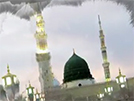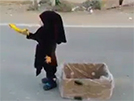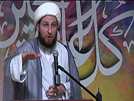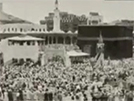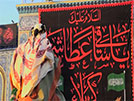Verse148
- Details
- Hits: 2666
(148) وَلِكُلٍّ وِجْهَةٌ هُوَ مُوَلِّيهَا فَاسْتَبِقُواْ الْخَيْرَاتِ أَيْنَ مَا تَكُونُواْ يَأْتِ بِكُمُ اللّهُ جَمِيعًا إِنَّ اللّهَ عَلَى كُلِّ شَيْءٍ قَدِيرٌ
148. " Everyone has a direction to which he turns, so hasten to precede each other towards all that is good.
Wherever you (may) be, Allah will bring you altogether (unto Him); surely Allah is All-Powerful over all things."
Commentary :
Every Religion has a Qiblah
This verse is, in fact, an answer to the Jews who made a vast uproar about the event of the change of Qiblah. It says:
" Everyone has a direction to which he turns, ..."
There had been different directions of the Qiblah during the history of prophets. The change of the direction of a Qiblah is not a strange thing, because it is not like the principles of the religion which are permanent, nor is it similar to Divine affairs which are impossible to interfere in. Therefore, do not make such a big deal about the Qiblah.
"... so hasten to precede each other towards all that is good. ..."
Instead of spending all your time on talking about this minor subject, you had better pay attention to doing good deeds and having pure intentions which have a broad racing field where you can challenge to precede each other, because the criterion of the value of your existence is your pure good actions.
This meaning is just like what is stated in verse 177 of the current Sura: " It is not righteousness that you turn your faces towards the East and the West, but righteousness is that one should have faith in Allah, the Last Day, the angels, the Book, and the Apostles, ..."
If you want to examine Islam or Muslims, you can utilize this criterion for analysis, not the problem of the change of the Qiblah.
Then, as warning to the objectors and encouraging the good-doers, it says:
"... Wherever you (may) be, Allah will bring you altogether (unto Him); ..."
in the Great Court of the Hereafter which is the final stage of reward and punishment.
It is not such that some be busy doing righteous works and some others do not do anything but destruction and spend their time spoiling others' deeds and, yet, these two groups be treated equally without having any reckoning or any recompense.
The idea may seem surprising for some people that how it is possible that Allah gathers the particles of the scattered dusts of men wherever they may be, and brings them into a new life, then, it immediately says:
"... surely Allah is All-Powerful over all things."
Indeed, the existence of this statement at the end of the verse is evidence for the statement preceding it, which says:
" Wherever you (may) be, Allah will bring you altogether (unto Him) ".
Explanation :
The Day When Imam Mahdi's (a.s.) Adherents Assemble
According to numerous traditions narrated from the holy Ahlul-Bait (a.s.) cited in Islamic literature, the expression: " Wherever you (may) be, Allah will bring you altogether (unto Him) " has been rendered into the adherents of Imam al-Mahdi, the twelveth Imam,(a.s.).
It is quoted in ' Raudat-ul-Kafi ' from Imam Muhammad Baqir (a.s.) who,after mentioning this expression, said: " It means the adherents of Imam Gha'im (a.s.) who consist of three hundred and thirteen men. By Allah, they are the objective meaning of the phrase / ummat-ul-ma'dudah /. By Allah, they all will gather together at the same time like the autumnal wind-driven broken clouds that become cumulus." (1)
It is also narrated from Ali-ibn-Musa-ar-Rida, the eighth Imam, who has said: " By Allah, when al-Mahdi (a.s.) rises, Allah will gather all our followers from all cities unto him." (2)
There is no doubt that this commentary is one of the deep innate meanings of the verse. Based on Islamic traditions, we know that there are layers upon layers of meaning concerning the verses of the Qur'an. One of them is the apparent meaning which is universal and general; and others, which are the deeply hidden ones which none knows except the Prophet (p.b.u.h.), the sinless Imams (a.s.), and those whom Allah wills.
In other words, these traditions refer to this very meaning that the Creator, Who is able to gather the particles of the scattered dusts of men from different parts of the world, can easily bring the adherents of al-Mahdi (a.s.) on one day and at one time together to strike the first spark of the establishment of the revolution for the settlement of the godly government in order to put an end to tyranny and transgression, and establish Divine Justice among people throughout the world.
(1) Raudat-ul -Kafi, vol.8,p.313, Tradition 478
(2) Majma' -ul- Bayan,vol. 1,p.231




